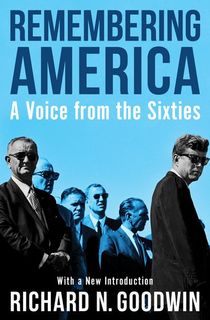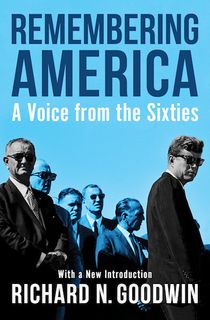Richard Naradof Goodwin, an accomplished author, speechwriter, and trusted adviser to presidents John F. Kennedy and Lyndon B. Johnson, passed away on May 20 at the age of 86. His death caps an extraordinary career in politics and American letters, during which Goodwin’s commitment to justice and gift for communication—he’s credited with coining the phrase “Great Society”—helped shape the direction of the Democratic Party through the 1960s and beyond.
Goodwin’s life in politics began in 1958, when he served as a law clerk for Supreme Court Associate Justice Felix Frankfurter. A year later, he joined the speechwriting staff of then-senator John F. Kennedy. By January of 1961, Goodwin entered the White House as a member of the Task Force on Latin American Affairs and assistant special counsel to President Kennedy.
What followed was an astonishing journey through U.S. government during one of the most turbulent eras of American history. After Kennedy’s assassination in 1963, Goodwin continued to serve under President Lyndon Johnson. During his tenure as special assistant to the president, Goodwin penned Johnson’s historic "We Shall Overcome" civil rights speech in support of the Voting Rights Act of 1965—reportedly written in all of eight hours—and helped forge the domestic legislative agenda of the Great Society.
Goodwin’s relationship with Johnson soured over the President’s commitment to the Vietnam War. By September 1965, he had resigned from his position at the White House and soon joined the anti-war movement. In 1968, Goodwin threw his support behind the presidential ambitions of Robert F. Kennedy—and was with Kennedy in Los Angeles on the June night he was assassinated.

Goodwin (left) meets with Bill Moyers (center) and President Johnson (right) in the Oval Office
Photo Credit: Wikimedia CommonsGoodwin continued to write post-politics, publishing a number of essays and books. In 1975, he married Doris Kearns, herself a deeply talented chronicler of American politics who wrote Team of Rivals, The Bully Pulpit, and No Ordinary Time.
While Goodwin never again entered the political fray to the degree that he did in the 1960s, he was never far away. In 2000, he helped write Al Gore’s concession speech after the Supreme Court stopped the Florida recount during the 2000 presidential election.
Throughout his life, Goodwin's commitment to progress and equality never wavered. His political memoir, Remembering America: A Voice from the Sixties, offers an engrossing behind-the-scenes look at the political landscape of 1960s America—both its victories and its disappointments—and serves as a powerful call to action for readers committed to justice today.
Read on for an excerpt of Remembering America: A Voice from the Sixties, and then download the book.
At noon, January 20, 1961—two and a half years after my graduation from law school—I became assistant special counsel to the president of the United States. My elevation took place simultaneously with that far more historic moment when John Kennedy took the inaugural oath before the aging hero of liberalism, Chief Justice Earl Warren. As I stood in that bitter-cold, iridescent day—sun glistening from the marble, the snow scattered from the unobstructed heaven—it seemed as if the country and I were poised for a journey of limitless possibility.
After the ceremony, I watched the inaugural parade from the presidential reviewing stand in front of the White House. It was emblematic of New Frontier heroics to come that I sat—along with the president, his family, and other officers of his administration—through the freezing hours of an interminable procession. Will it never end, I thought, shivering, or will the whole country pass in review?
When the parade was over I wandered into the West Wing of the White House to look at my new office. After inspecting my cramped but hugely portentous space, I walked along the first-floor corridor toward the Oval Office. Approaching me—having yielded to a similar impulse to inspect his chambers — I saw the figure with whom I had shared sixty days in the cramped cabin of a twin-engine Convair named Caroline, as we crossed and re-crossed the country during frantic months of campaigning.

Richard Goodwin works with President Kennedy
Photo Credit: AlchetronKennedy had changed from his formal wear to a dark business suit; moved with the same purposeful stride. He looks just like he always did, I thought, as if I had expected his ceremonial ascension to metamorphose his outward appearance—ennoble his features, enlarge his physical stature, ready him for immediate transport to Mount Rushmore.
“Dick,” he called, beckoning me toward him. His voice hadn’t changed either. As I approached him, I could see excitement in his eyes. And why not? I had been exhilarated at the sight of my own small office. He ran the whole place.
“Mr. President,” I replied.
“Mr. President.” What grandeur in the phrase, how lovingly it passed my lips. If there was such swollen warmth in saying it, what must it be like to hear?
“Did you see the Coast Guard detachment?” he asked. Frantically I canvassed my memory of the parade. Impatiently Kennedy interrupted my efforts at recollection. “There wasn’t a black face in the entire group. That’s not acceptable. Something ought to be done about it.”
The observation was an order. It was a manner of command I had learned well over the brief period of my employment. I turned immediately. Struggling to maintain the dignity of office, I walked down the corridor until, turning the corner, I began to run up the stairs toward my office. The Coast Guard? I thought. Who ran the Coast Guard? The Pentagon, Bob McNamara. No, the Treasury Department. Doug Dillon.
Then it struck me: swift, accelerating elation. I was not to draft a statement or make a promise. Now we could do more than talk. We could change it! This was what it had all been about: the struggle, the fatigue, the fear, the uncertainty, the slim, fragile victory. It was the meaning, the essence of that abstraction—power. For a moment, it seemed as if the entire country, the whole spinning globe, rested, malleable and receptive, in our beneficent hands. “Here on earth God’s work must truly be our own.” I did not pause to reflect upon what I knew with philosophic certainty—that we were neither gods, not special intimates to His will. And why should I? We would do what men could do. And men—determined, idealistic, tough-minded, powerful—could perform great works, high deeds in Albion past all men’s believing.
I picked up the White House phone. “Get me Secretary Dillon, please,” I asked the White House operator. Dillon listened to my report of the president’s comments. “Tell him I’ll get right on it,” he replied.
That summer the first black professor was hired at the Coast 11 Guard Academy and the following year four black cadets entered the academy. The first irreversible steps toward desegregation had been taken.
We had made a difference. I had helped make a difference. It was, admittedly, a small problem, one resolvable by presidential authority alone. But it was successfully resolved. And the exhilaration of that achievement reinforced my belief that far larger dangers and difficulties could also be mastered; that it was a great country, but it would be greater.
Want to keep reading? Download Remembering America: A Voice from the Sixties, by Richard N. Goodwin.
This post is sponsored by Open Road Media. Thank you for supporting our partners, who make it possible for The Archive to continue publishing the history stories you love.
Featured photo of Richard Goodwin: Alchetron


